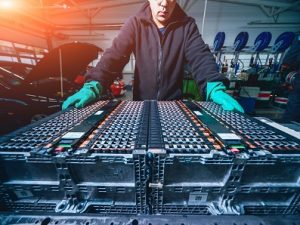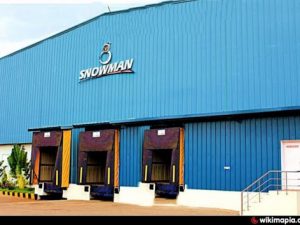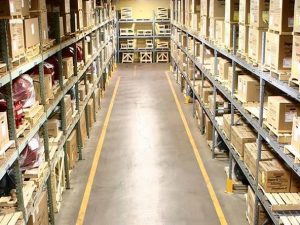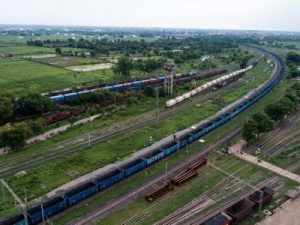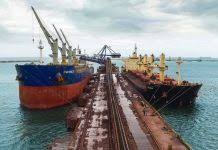According to expert scenarios forecast, there will be more than 130 million electric vehicles on the roads globally by 2030 . Seeing the strict legal requirements for transporting and warehousing batteries, DB Schenker has launched a new and dedicated service that combines individual national and international regulations concerning battery types and transportation modes. Power and availability of batteries are key to of this transport shift, manufacturers face new challenges managing the logistics around their supply. Jochen Thewes, CEO, DB Schenker, “Batteries are the main drivers of the ongoing electrification of the world. With our global network, we can cover the whole logistics spectrum to create reliable solutions for safe and customised battery transport and storage. We believe that e-mobility will be a key driver towards a more sustainable future. With our new service dedicated to battery logistics, we are proud to be a facilitator of this game-changing development.”
Read More »Snowman Logistics on an expansion mode; adds more warehousing capacity
Snowman Logistics has announced capacity expansion by adding to their pallet capacity across the country. The company has commenced construction at the Siliguri facility and is further adding pallet capacity to Taloja and Krishnapattanam facilities taking the total pallet capacity to 1,13,208 with a presence in 16 cities catering to the key markets of Mumbai, Chennai, Bengaluru, and Kolkata. Snowman will add 4200 pallets at Siliguri and will expand Taloja (Mumbai) and Krishnapattanam facilities by a total of 3000 pallets. All these facilities are scheduled to be up and running before this financial year-end. The company caters to its comprehensive network of reputed clients, which source and consume temperature-sensitive products in bulk amounts.
Read More »India to save 20% cost in container transport to CIS countries via Chabahar Port: Mandaviya
According to Mansukh Lal Mandaviya, Union Minister of State for Shipping, “By developing strategic Chabahar Port in Iran, India will reduce logistics cost by 20 per cent in container transport to CIS countries, bypassing China or Europe.” He explains, “So far, CIS (Commonwealth of Independent States) countries could be reached only via China or Europe. There was no other connectivity with CIS countries. Chabahar port, located in the Sistan-Balochistan province at energy-rich Iran’s southern coast, lies outside the Persian Gulf and is easily accessed from India’s western coast, bypassing Pakistan.” “In a strategic development, loading and unloading of cargo has started at Chabahar Port. CIS countries include Armenia, Azerbaijan, Belarus, Kazakhstan, Kyrgyzstan, Russia, and Uzbekistan. Now, we have developed Chabahar port and there is direct connectivity to these countries via Afghanistan,” the minister said. “Transshipment of cargo started last week at Chabahar Port,” he adds. “Chabahar Port is scaling up its operations drastically. India Ports Global terminal loaded 76 TEUs (twenty foot equivalent unit) all refrigerated for India. This is record single loading and is a milestone in growth path of Chabahar Port,” he said.
Read More »3rd CargoTalk digital conclave today at 10am-12:15pm
The third edition of CargoTalk digital conclave will begin today at 10 am till 12:15 pm. There will be two sessions each of one-hour duration, which will lay emphasis on re-engineering the future. Experts from air cargo and road logistics will share their views. Panelists for first session titled ‘Digitalisation: Building and Enabling Confidence’ (10am-11am) will be Saurabh Kumar, CEO, GMR Hyderabad Air Cargo, Amar More, Director, Kale Logistics Solutions and Keku Gazder, CEO, AAICLAS. For the second session, titled ‘The Road ahead – Driving to Success’ (11:15am-12:15pm), there will be Chander Agarwal, Managing Director, TCI Express, Aditya Shah, Executive Director, V-Trans India and Ashok Goyal, Managing Director, BLR Logistiks.
Read More »Prama Hikvision introduces AcuSense technology for warehouse monitoring
With people and transportation constantly flowing in and out of the warehouse property, it’s a constant hub of activity. It puts them at risk for many things, like a fire, or a flood, product damage, or employee safety. Among them, theft is a critical problem. Warehouses have commonly incorporated video cameras to help catch activity going on in and around the property. But in most cases, when loss is identified, the warehouse manager or security staff turn to the video security system to search for the right footage. The challenge is that there is an ocean of video footage, and sometimes none of it clearly tells what happened. This makes forensic search difficult and time-consuming. In short, conventional video monitoring systems cannot effectively help identify an intrusion event at the time it is happening and thus prevent at the very beginning. Accurate trespassing alarm Video monitoring with accurate trespassing alerts on the detection of a human intrusion event will be a great improvement. Today’s security products equipped with Prama Hikvision’s AcuSense technology automatically send out alerts when a human or a vehicle is detected. With an advanced deep learning algorithm, technology precisely distinguishes and categorizes objects into human, vehicle and other. Alarms triggered by the ‘other’ objects such as a beam of light, an animal, the movement of foliage, etc., are disregarded, leaving the true events which are associated with humans and vehicles for users and security personnel to focus and act. Additionally, related videos are automatically sorted by categories for easier search. Focused technology in action So in the warehouse setup, AcuSense cameras are installed to stay alert day and night. If an intruder enters an area of attention, …
Read More »Indian Railways operates 2.8 km longest freight train ever, SheshNaag
Indian Railways has created a record by operating a longest Indian goods train ever, named SheshNaag. The rake had a total of 251 wagons pulled by four electric locomotives which were fitted in between. The train had four empty BOXN rakes. At the moment, Indian Railways is prioritising the movement of freight trains in its network by moving multiple freight rakes together as it helps in saving the transportation time and also help in the decongestion of the rail route. “The experiment of attaching multiple rakes of freight trains together and transporting them from one place to another has been successful,” tweets, Piyush Goyal, Railway Minister
Read More »CargoTalk digital conclave to discuss the aspects of road freight movement
The third edition of CargoTalk digital conclave is all set to be held tomorrow, Tuesday, July 7 with a focus on impact of COVID-19 on road logistics. Speakers will include Chander Agarwal, Managing Director, TCI Express, Aditya Shah, Executive Director, V-Trans India and Ashok Goyal, Managing Director, BLR Logistics. The session between 11:15 am to 12:15 pm will discuss how the industry has managed in these challenging times when the world’s biggest lockdown has brought road freight movement to nearly a standstill.
Read More »Govt to create national logistics law to promote growth in the sector: Commerce Ministry
“In order to streamline the logistics eco-system in the country, a National Logistics Efficiency and Advancement Predictability & Safety Act (NLEAPS) is under consideration,” informs, Pawan Agarwal, Special Secretary (Logistics), Ministry of Commerce & Industry at a webinar organized by the PHD Chambers of Commerce. Stressing on defining the various elements in the logistics sector, he says, “What the logistics sector is all about is not very clear to us as of now. The government is considering replacing the multimodal transportation of goods law with national logistics law to promote growth of the sector.” “The high logistics cost of country is impacting the competitiveness of domestic goods in the international market. India’s logistics sector is highly fragmented and the government aims to reduce the logistics cost from the present 14 per cent of the Gross Domestic Product to less than 10 per cent,” tells Agarwal. He continues, “During the times of COVID-19, there has been a disruption in the supply chain and movement of truck with many of the supplies diverting to the rail; making it a reliable and cost effective mode of transportation. In these indispensable times, we have realised the importance of essential services with their regular supply chains,” he adds. According to Agarwal, digitisation of logistics is the need of the hour which will increase the efficiency in movement of goods. He also informs that the government is working on creating digital platforms and mobiles apps for logistics such as warehouse information tracking and trading yard (WITTY), among others to mapping of warehouses. Agarwal believes that logistics is a sector that needs to realise the vision of ‘Aatma Nirbhar Bharat’.
Read More »3rd CargoTalk digital conclave tomorrow; to focus on digitalisation
The third edition of CargoTalk digital conclave is all set to be held tomorrow, Tuesday, July 7 with a focus on how digitalisation building and enabling confidence. Speakers will include Saurabh Kumar, CEO, GMR Hyderabad Air Cargo, Amar More, Director, Kale Logistics Solutions, Keku Gazder, CEO, AAICLAS. The session between 10:00 am to 11:00 am will cover subjects such as practices the industry has learnt from COVID-19 experience, technology solutions which are the need of the hour for the industry, etc.
Read More »Kidderpore Docks get investment worth Rs 186 crore to enhance cargo handling capacity
The Kolkata Port Trust, now renamed as Shyama Prasad Mookerjee Port, has decided to rejuvenate its Kidderpore Docks (KPD) at an estimated expenditure of Rs 186 crore through Public-Private-Partnership (PPP) mode. The rejuvenation programme will be implemented in KPD-I West, one of the four parts of the KPD, and it will help increase its cargo handling capacity by four to five times. The programme will work on Build-Equip-Operate- Transfer basis for a period of 30 years and the bidder who will pay the highest revenue to the port will be the new operator. “The project will be implemented in two phases. It is expected to yield 2.5 million tonne of cargo per annum in phase-1. In phase-2, three more berths shall be developed and capacity addition of 1.5 million tonne per annum is expected,” informs, Vinit Kumar, Chairman, Shyama Prasad Mookerjee Port.
Read More » Cargo Breaking News
Cargo Breaking News
